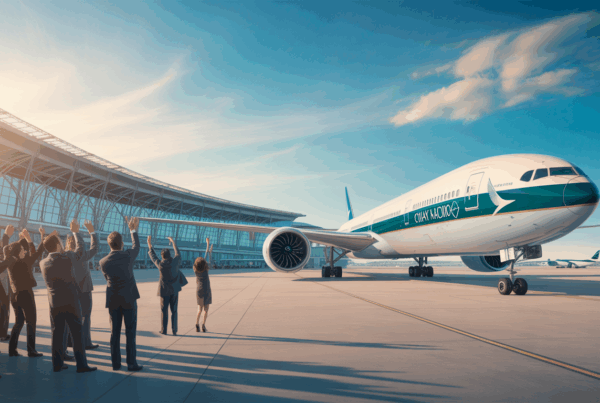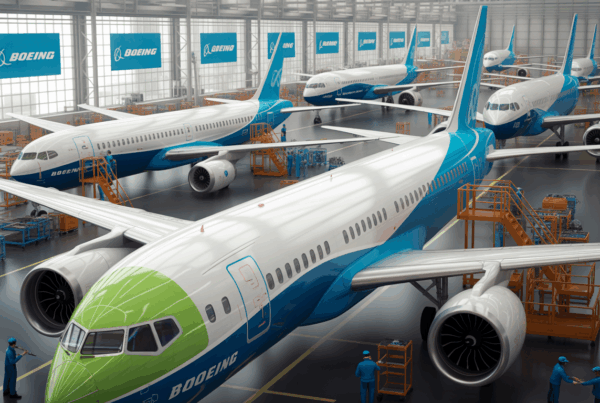The main Boeing rejected management's latest proposal to increase salaries by 30% over four years, to end a strike that has paralyzed the company for ten days. The workers, whose wages have been frozen since 2012, are demanding an increase of at least 40% to offset the loss of purchasing power. With the participation of 33 000 The labor dispute is not about to be resolved, and negotiations are due to resume next week.
Boeing workers continue their strike despite management's proposals for wage increases, which are deemed insufficient. The main employee union has rejected the latest offers, prolonging a strike that has been disrupting operations at the American aircraft manufacturer for several days now. This article details the various aspects of this industrial dispute.
The Boeing strike: origins and demands
The Boeing workers' strike began on September 13, 2024, following an overwhelming vote by IAMAW union members in favor of industrial action. The workers are demanding a salary increase of at least 40%Management's current offer only provides for an increase of 30% over four years, which does not meet their expectations.
The wage freeze since 2012
One of the main reasons for the strike is the wage freeze since 2012. This wage stagnation has led to a loss of purchasing power for Boeing employees, exacerbated by the absence of inflation compensation measures.
Spending cuts and employee discontent
For several years now, Boeing has been implementing cost-cutting which helped to exacerbate employee discontent. According to an article in Air JournalThese policies have affected employees' working conditions and salary prospects.
Management proposals
Despite management's attempts to end the strike, the proposals made so far have not convinced the workers. On September 8, Boeing proposed an increase of 25%, which was deemed insufficient. The latest offer includes a 30% increase over four yearsbut this proposal was rejected by the main union.
The unions' reaction
The unions clearly expressed their dissatisfaction with this proposed wage increase. According to NPR radio, the agreement would have raised wages by 25% and reduced employees' share of costs. However, this plan falls far short of the workers' initial demands for a 40%.
Impact on Boeing operations
The strike paralyzed the American aircraft manufacturer's operations, affecting more than 33,000 workers. The persistence of this industrial action is causing production delays and significant disruption for Boeing and its customers.
Consequences for the aeronautics industry
This strike at Boeing is not an isolated case. It is part of a wider context of social conflicts within the aeronautics industry, as witnessed by the recent strikes at Charleroi-Bruxelles Sud airport, and the strike action planned at Paris airports ahead of the Olympic Games, as discussed by FlyWest.
Efforts towards a resolution
Negotiations between Boeing and the unions are continuing under the supervision of mediators. The aim is to reach an agreement that would satisfy both parties and allow operations to return to normal. However, according to Stock market zoneHowever, the prospects for an immediate resolution remain uncertain, further prolonging this social crisis.
Boeing's main union has rejected a wage increase proposal of 30%, extending a ten-day strike. The workers, whose wages have been frozen since 2012, are demanding an increase of at least 40%, while the current offer proposes 25% over four years.
Wage increase proposal rejected
Boeing workers refused to accept a pay rise. 30% on the grounds that it does not compensate for the loss of purchasing power since 2012. More than 33,000 workers are involved in this strike, which is paralyzing production.
Workers' requests
Strikers call for salary increase of at least 40% to reflect the rising cost of living. Management had proposed an increase of 25% over four years, which was deemed insufficient by the union.
Negotiations stalled
Negotiations are at a standstill despite massive support from workers, illustrated by a vote in 96% in favor of strike action. Management and unions are due to meet again next week to try to reach a mediated agreement.
Economic considerations
Since 2012, wages at Boeing have been frozen, resulting in a net loss of purchasing power. Management must take this reality into account to "reset" labor relations on an equitable basis. Compromise is crucial to avoid prolonging the conflict, which could further paralyze the company.
FAQ - Conflict at Boeing: Break in negotiations on workers' wages
What is Boeing's proposed pay rise?
Boeing offers a 30% wage increase over four years.
Why did Boeing employees reject this proposal?
Boeing employees, represented by their main union, have rejected the latest proposal because they are calling for a more equitable compensation package. salary increase of at least 40%. What's more, they feel that current supply does not compensate for the loss of purchasing power accumulated since 2012.
How long has the strike lasted so far?
The strike began on September 13 and has already lasted more than ten days.
What was the employee turnout for the strike vote?
The strike was approved by a majority of 96% by members of an IAMAW Regional District.
When are negotiations between Boeing and the union due to resume?
Boeing and the union negotiators are expected to return to the negotiating table next week for supervised talks.




